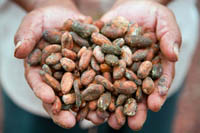
The Money Is in the Chocolate
You’d think that the economic value of a product would be in the raw material. To a small degree, you’d be right. But the greater value by far is in the production process, especially in high-end products such as gourmet chocolate. Making chocolate generates five times more income than fair trade cocoa, even if your beans are considered the finest in the world, according to Tim McCollum of Madécasse.
While the chocolatiers in Switzerland, Belgium, and the U.S. live the high life, the cocoa farmers in Madagascar live subsistence lives. Tim and his business partner, Brett Beach, decided to change that by bringing the art of making chocolate to where the cocoa beans are grown.
Moving the Return Closer to the Source
These social entrepreneurs moved the higher-value links in the chocolate chain to Madagascar. The company’s chocolate is produced and packaged in Madagascar to keep the economic benefit within the country.
Although Madécasse chocolate doesn’t carry the Fair Trade label, the company has reduced the number of middlemen, ensuring that farmers get a better price for their cocoa. Madécasse also provides technical information and tools to the first links in the value chain – the farmers – to ensure the quality of the chocolate. For example, the cocoa beans must be carefully fermented to bring out the best flavor. Proper fermentation is critically important. Farmers are taught how to do this and are provided the best tools to ensure their success.
Why Madagascar?
Madagascar is one of the poorest countries in the world. Tim and Brett met there while in the Peace Corps. When they returned to the U.S., these two socially conscious guys decided to use their training in an entrepreneurial way. They wanted to have a positive social impact on the country they have grown to love.
They learned that Madagascar is known for high-quality cocoa beans, perhaps because organic farming is practiced in Madagascar. Madagascan farmers have never used pesticides; they always use natural mulch and composts as fertilizer; and hand-pick the cocoa beans.
No Good Deed Goes Unpunished
You’d think that a company as well intentioned as Madécasse would be spared the challenges of entrepreneurship. Tim and Brett were disappointed by a less-than-rave review by a New York Times food critic in November, 2009, so they decided to change equipment and recipes. By April, 2009 the new and improved chocolate was shipped. Now Jill Santopietro, of the Times T Magazine, says this chocolate is her favorite. Don’t take Jill’s word, try it for yourself.
Some challenges haven’t been as easy to fix. In March 2009, a coup d‘etat brought a new president to power. The U.S. government dramatically cut aid to Madagascar including the non-governmental agencies assisting cocoa farmers. Madécasse now provides assistance to the farmers directly, which adds more costs to them.
And other challenges arose: a 30% hike in fuel costs, regular power outages in Madagascar, currency fluctuations (they may switch from Euros to either dollars OR possibly even the local currency, called Ariary), and a U.S. economy that has lost its taste for expensive indulgences. As we approach the holiday season, think about giving the gift of Madécasse chocolate – a doubly sweet treat. Delicious and socially responsible.
A Social Entrepreneur’s Motivation
Without passion and a deep-seated belief in what they’re doing, Tim and Brett might have thrown in the towel. But they haven’t. They’re still there, working on ways to continue as socially responsible entrepreneurs in a tough business environment.
It’s passion that keeps an entrepreneur going when things get tough. How has your passion helped you take the long view when you hit a road bump?
